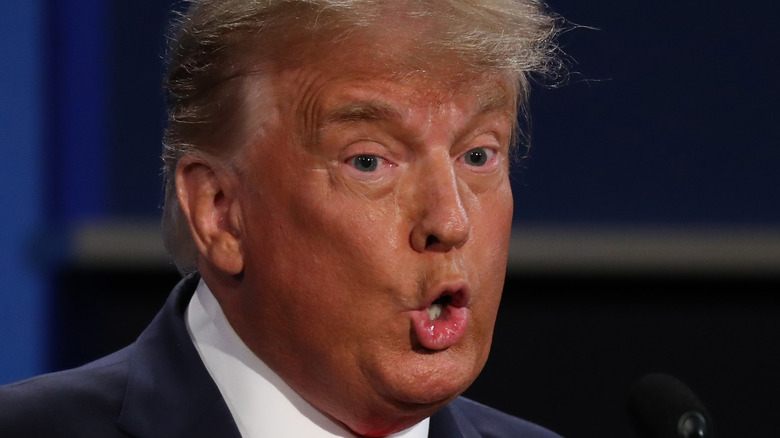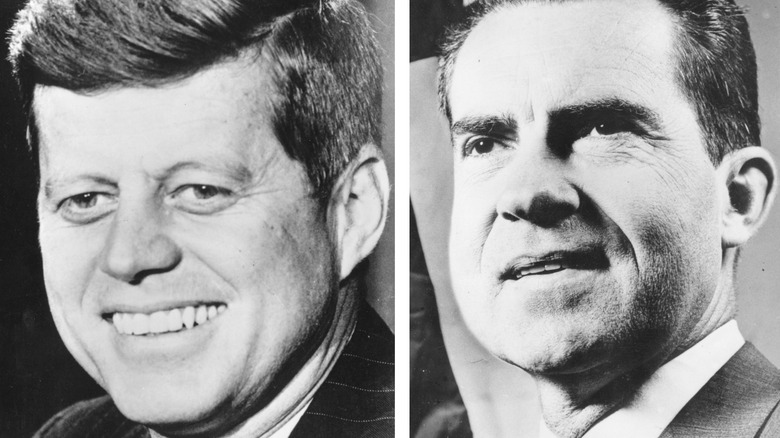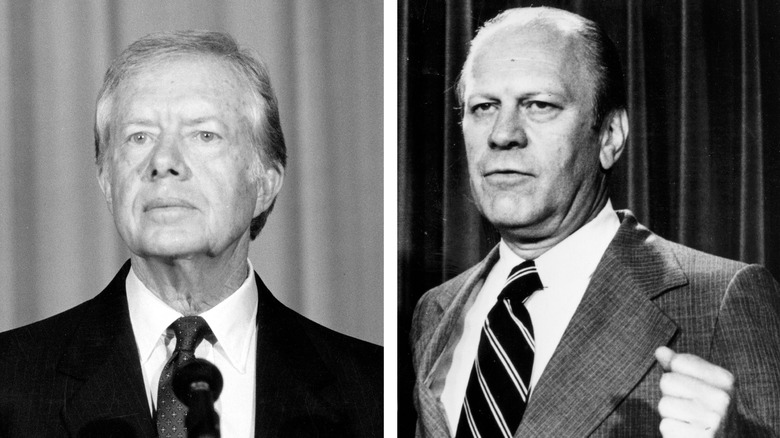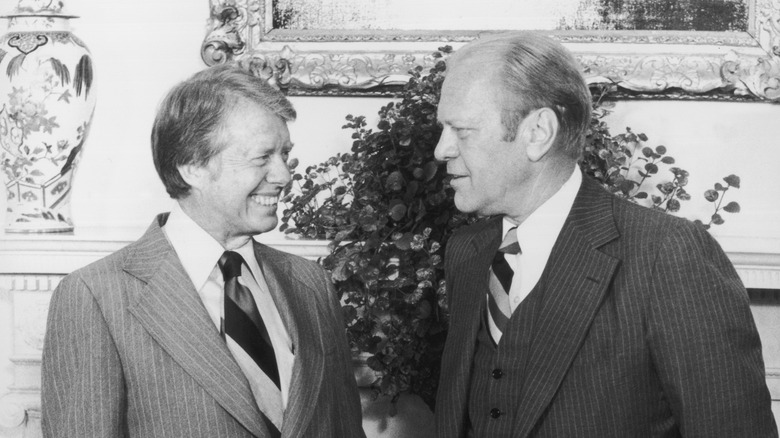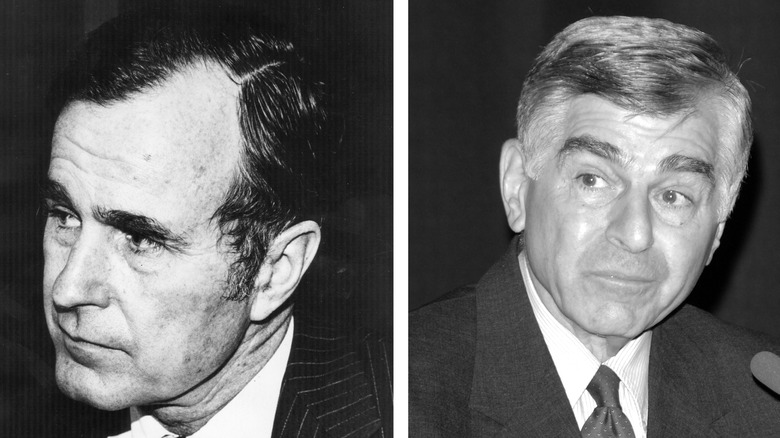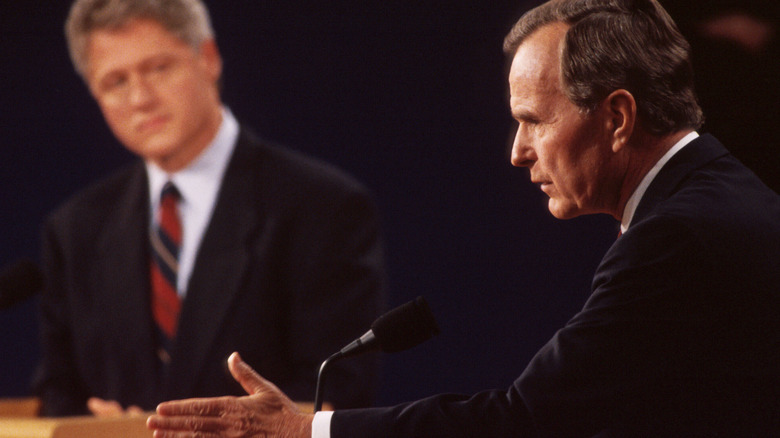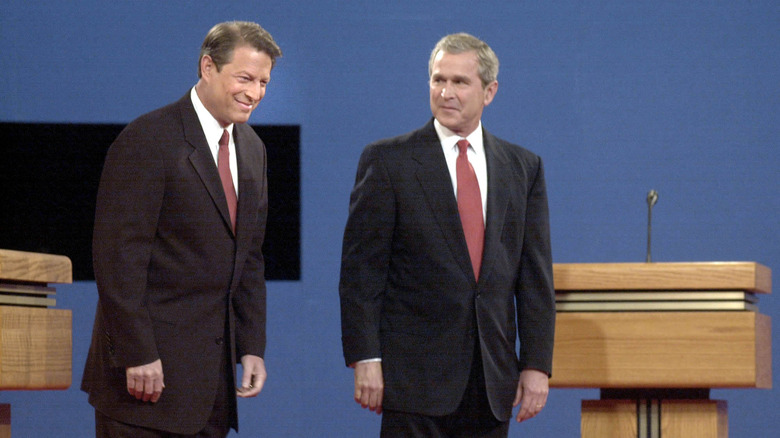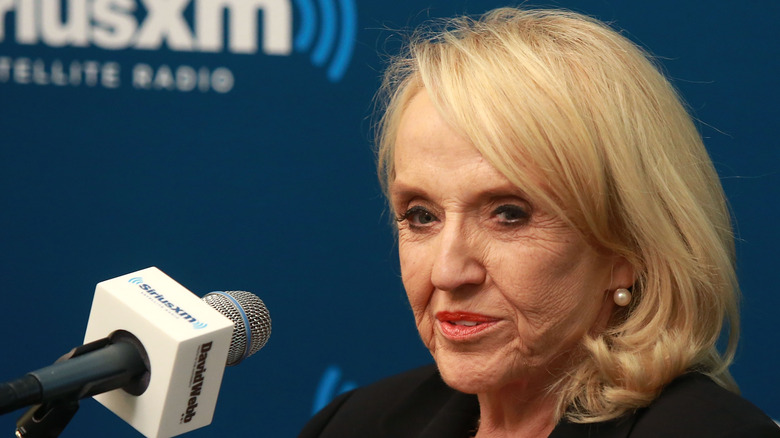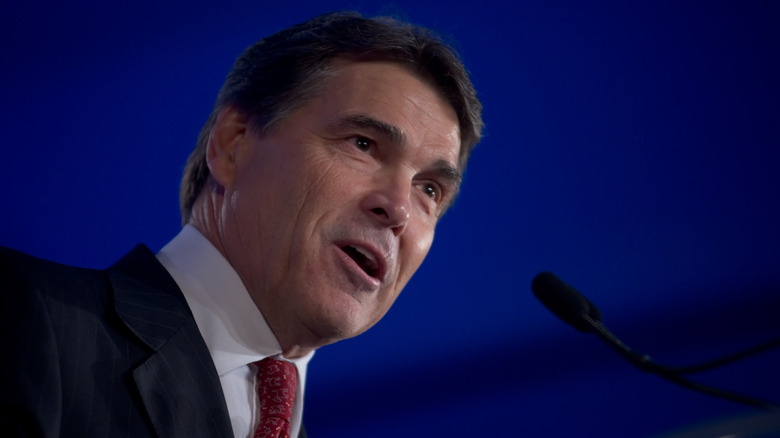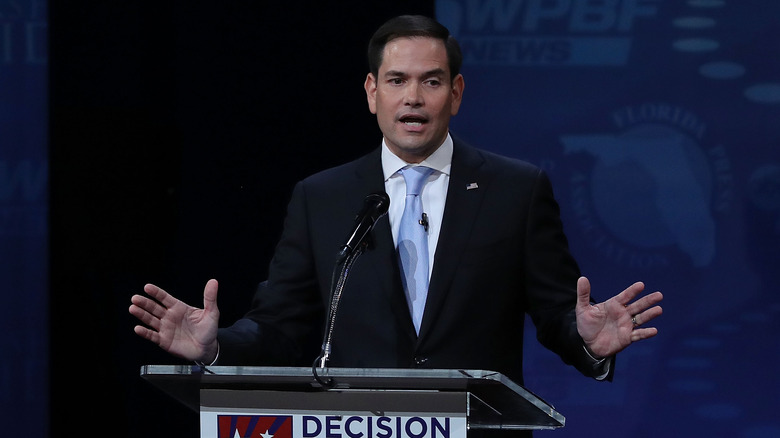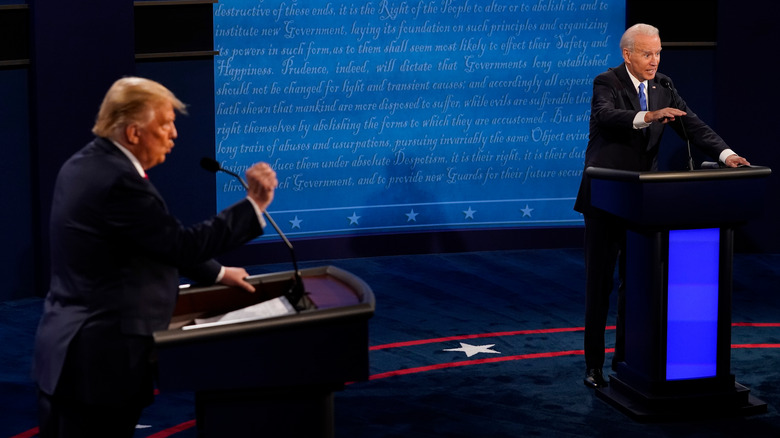Political Debate Moments That Caused A Stir
Regardless of how much prep time or media experience they have, it's understandable for even the most experienced politicians to get nervous and misspeak when the nation is watching them live in a performance that could make or break their career. It's even worse when they're getting attacked by a rival standing eight feet away or while getting asked tough questions by the moderator. So it's no wonder that gaffes and embarrassments flow like the Nile whenever candidates take off the gloves for a televised debate. And even when everyone's on the ball, technical difficulties — and the candidates' response to them — might still plague the evening and overshadow whatever zingers or killer soundbites they've prepared.
So while you might think that political debates are only interesting to that nerdy friend who never shuts up about local mayoral politics or getting H.R. 773 passed, the reality is that ever since America first tuned in to see their presidential options duke it out in a live setting in 1960, debates have served up plenty of juicy, hilarious, outrageous, and downright bizarre material for pundits to obsess over. It's high stakes for politicians — and great entertainment for the rest of us. (Until you realize whoever wins might have access to the nuclear football, but we digress.)
From Jan Brewer's awkward freeze to Mike Dukakis' passionless performance and Marco Rubio saying the same thing over and over again, these are just a few political debate moments that got people talking.
1960 - Kennedy vs. Nixon
Televised debates have become so expected and commonplace that Scientific American wonders whether or not they still have any value or impact at all. Politico says the only way a debate could move the needle one way or the other is if somebody absolutely bombs. But Barack Obama comfortably won a second term after flopping in his first debate against Mitt Romney in 2012 (summarized by The Guardian). More recently, during the 2022 Pennsylvania senate race, AP News says John Fetterman, recovering from a stroke, gave an excruciating performance against Dr. Oz, only to cruise to victory weeks later, per CNBC. So even debates with a clear winner and loser aren't always decisive factors.
But this wasn't always the case. In the same way that sound, color, and CGI used to impress moviegoers a lot more than they do now, early televised debates had profound effects on the electorate. Senate says the format was pioneered in 1956, when surrogates for the incumbent Eisenhower administration and challenging Adlai Stevenson campaign, discussed the issues on TV for the first time. But it wasn't until four years later when presidential candidates themselves appeared live before the eyes of the world. History says that people listening on the radio thought that Republican (and incumbent vice president) Richard Nixon won. But folks watching on TV were drawn in by John F. Kennedy's youth and confidence. He would ultimately win a narrow victory that November. Clearly, televised debates were here to stay.
1976 - Ford vs. Carter
Gaffes are so common in politics that voters are unlikely to completely write a candidate off for a mild slip of the tongue. Just look at the successful political careers of George W. Bush, Donald Trump, and Joe Biden — three guys who rose to the presidency despite developing a taste for their own feet that often sent their opponents into fits of laughter.
But there's a crucial difference between misspeaking or saying something embarrassing on a hot mic, and what incumbent Republican Gerald R. Ford said at a 1976 presidential debate against his challenger, Democratic former governor Jimmy Carter. According to PBS, debates hadn't occurred since the original Kennedy vs. Nixon ones 16 years earlier. But Ford agreed to meet Carter because he needed a great night to salvage polling numbers that were sinking after voters had soured on both the Republican Party for the Watergate scandal that toppled Nixon, and Ford in particular for pardoning the guy. Unfortunately for Ford, he wouldn't get the boost he needed.
When the topic of the Cold War came up, Ford inexplicably said (via the Miller Center), "There is no Soviet domination of Eastern Europe and there never will be under a Ford administration." When the moderator asked him to clarify the statement, he bizarrely doubled down, insisting despite all available evidence that the USSR wasn't militarily or politically dominating that part of the world. Saying this in 1976 would be like saying that the sky is green or that 2+2 = 46.
1976 - Carter vs. Ford
It's important for presidents to play it cool when faced with technical difficulties. When a balloon popped loudly during a speech, for example, Ronald Reagan — who History says barely survived an assassination attempt — got the crowd rolling by quipping "missed me," before continuing his speech. And here's an Associated Press video of President Obama playing off the presidential seal loudly tumbling off the podium mid-speech by saying, "That's alright. All of you know who I am." Cue more laughter from a charmed crowd.
But neither incumbent Republican President Gerald Ford nor Democratic challenger Jimmy Carter had the effortless charisma of Reagan or Obama. Lawford83 has footage of the moment when the sound cut out during their 1976 debate, leaving viewers wondering why they couldn't hear the candidates, and anchors struggling to fill the silence while the issue was resolved.
Rather than relaxing for a bit, both candidates decided to stand silently still behind their podiums like awkward robots for 27 painful minutes. The West Central Tribune says this was because nobody knew when the sound would come back on and didn't want to be caught in the middle of a weird remark when it did. Plus, neither one wanted to walk away or sit down as they waited it out, because it would look bad if the other guy didn't do the same. We suppose that makes sense. But man, is it weird to watch these two just stand there for half an hour.
1988 - Bush Sr. vs. Dukakis
Candidates have to take hard stances on polarizing subjects like abortion, taxation, and immigration all the time. And when they're inevitably asked to defend that position during interviews, press conferences, and debates, they'd better have an answer ready to go that explains it well, and convincingly, while also making them sound human and empathetic.
Apparently, Democratic nominee Mike Dukakis did not get this memo. In a video for NBC, anchor Chuck Todd remembers when, during a 1988 presidential debate against incumbent Vice President George H.W. Bush, Dukakis was asked if he would reconsider his hardline anti-death penalty position if the perpetrator had committed unspeakable acts on his wife, Kitty Dukakis, before murdering her. "No I don't, Bernard," Dukakis responded, "and I think you know that I've opposed the death penalty during all of my life [sic]. I don't see any evidence that it's a deterrent and I think there are better and more effective ways to deal with violent crime."
The moment was devastating for the Dukakis campaign, which of course lost badly to Bush that November, according to Britannica. As Todd explains, "Some debate moments are less about the substance and more about the passion, or lack thereof, in an answer." Dukakis came off sounding like an uncaring robot when he could have — and should have — acknowledged the pain experienced by victims' families rather than droning on about statistics and approaching the problem like a policy wonk rather than a human.
1992 - Bush Sr. vs. Clinton vs. Perot
Sometimes the smallest moments can have massive, history-changing consequences. You'd think national-level politicians who are used to having cameras in their faces at all times and their every word, action, and facial expression broadcast around the world and analyzed to death by talking heads on TV news programs would be aware of this.
But even George H.W. Bush, an incumbent president running for re-election who'd served as Reagan's VP for eight years and who'd been in politics for decades, could slip up every once in a while. Unfortunately for him, one of those tiny slip-ups happened during the three-way 1992 presidential debate between himself, Democratic challenger (and then-Arkansas governor) Bill Clinton, and billionaire third-party candidate Ross Perot, running as an anti-establishment choice.
U.S. News recalls when an audience member asked the president to explain how an ongoing recession, which was understandably hurting millions of voters and which was the foremost issue on everyone's mind for this cycle, had affected him personally. Rather than doing the easy thing, which would be listening intently with a concerned face, nodding along periodically, and just generally coming across like a human, Bush checked his watch. Needless to say, pundits had a field day decrying him as aloof, out of touch with ordinary folks, and unconcerned with their struggles. Clinton, meanwhile, seized the moment and wielded empathy like a master. He would, of course, go on to win the 1992 election and serve for eight years.
2000 - Bush vs. Gore
Between George W. Bush and Al Gore, who faced off against each other in the extremely close (and weird) 2000 election, most folks remember Dubyah as being the gaffe factory who couldn't keep his foot out of his mouth. Who can forget his "Mission Accomplished" speech (remembered by History), lines like "Rarely is the question asked: Is our children learning?" (courtesy of Morning Star), or, more recently, Bush trying to condemn the Russian invasion of Ukraine but accidentally saying that his own invasion of Iraq was "wholly unjustified and brutal" (per NPR)?
And yet, it was Gore, then the incumbent vice president under Bill Clinton, whose sloppy performance in their first televised debate got the pundits talking, and for all the wrong reasons. The Pew Research Center says Gore just couldn't stop sighing or rolling his eyes throughout the evening, making him seem like an unlikeable snob. In one bizarre moment, he even aggressively approached Bush (see the moment here, courtesy of user Didntsaythat), seemingly to intimidate him, only to awkwardly walk away after Bush disarmed him with a humorous nod and kept right on talking.
Pew says that Gore was seen as the clear loser when it was all said and done, his weird mannerisms and unlikable energy costing him a narrow lead. He would, of course, lose to Bush by the slimmest of margins. It just goes to show that charisma and empathy are just as important in a debate as knowing your stuff.
2010 - AZ gubernatorial debate
You probably don't remember her, but about 10 or 12 years ago, Republican Governor of Arizona Jan Brewer was a rising conservative star who made a name for herself as a harsh critic of then-President Barack Obama. The LA Times remembers when she confronted him on an airport tarmac and shoved a mean-looking finger in his face.
But the right-wing firebrand also had a particularly hard to watch series of gaffes during a 2010 Arizona gubernatorial debate. NPR says she took numerous awkward pauses where it looked like years of debate prep and media training were magically zapped out of her brain at the worst possible moment. The worst one was after she said, "We have done everything we could possibly do," before proceeding to freeze like the Arctic for nine brutal seconds (longer than it might sound). You can check out the excruciating moment here, courtesy of the Associated Press. We apologize in advance for the secondhand cringe you're about to experience.
Worse still, this happened during her opening statement (which, as NPR points out, are usually an easy slam dunk since the candidates prepare and practice what they're going to say for weeks and there are no surprises, interruptions, or tricky questions to trip them up). It of course proved to be a bleak sign of how the evening was going to go. After the debate ended, Brewer awkwardly left the building when reporters tried to grill her on an unrelated matter.
2011 - Republican presidential primary debate
BBC says it wasn't surprising that Mitt Romney, the presumed frontrunner for the 2012 Republican nomination from the day he announced, won the opportunity to get smacked around by Barack Obama that November. But it was a reasonably tight race for a few months, with conservatives like Herman Cain, Rick Santorum, Ron Paul, and long-serving Texas Governor Rick Perry all throwing their hats in the ring.
Given the fact that the last Republican president, George W. Bush, had also been governor of Texas, you'd think Perry would be decently positioned to get the nomination. But whatever chance he may have had was badly damaged when he forgot crucial talking points during a 2011 primary debate. Budget-cutting and shrinking the government have long been core pillars of the Republican platform, so Perry thought he had a winner on his hands when he started rattling off which departments he planned to axe should he make it to the Oval Office. Unfortunately, he could only remember two of the three.
"It's three agencies of government when I get there that are gone," Perry said. "Commerce, education, and the, uh ... what's the third one there? Let's see." He tried to laugh it off with the crowd, but the moderator wouldn't let him off the hook. "You can't name the third one?" he asks. Try as he might, Perry couldn't make it happen. "I can't," he finally says. Ouch. Check out the excruciating moment here, from bizbuzz2000.
2016 - Republican presidential primary debate
We all know what Shakespeare said about brevity and wit. Just say what you need to say, once, in as few words as possible. Florida Senator Marco Rubio, running for president alongside Ted Cruz, Rand Paul, Ben Carson, and eventual winner Donald Trump, among several others, apparently skipped that day in lit class, as evidenced by his embarrassing performance at a candidate-packed 2016 GOP presidential primary debate.
The first time he said, "Let's dispel once and for all with this fiction that Barack Obama doesn't know what he's doing. He knows exactly what he's doing," eight minutes and 29 seconds into the debate, according to CBS. It was a pretty solid zinger. But then he said the exact same thing, almost word for word, two minutes later, and again two minutes after that, at which point Chris Christie finally called him out for recycling it. Rubio tried to defend himself as the crowd applauded Christie for pointing it out, but the damage was done. Less than a full minute later, Rubio tried to sneak the line in yet again. To be fair, he did change the wording a bit to, "I think anyone who believes that Barack Obama isn't doing what he's doing on purpose doesn't understand what we're dealing with here." But nobody was fooled. The guy came to a career-defining debate with a single soundbite, and ran it, and his campaign, into the ground.
There are gaffes, and then there's ... whatever that was.
2020 - Trump vs. Biden
Hosted by Chris Wallace of Fox News, the first presidential debate between incumbent Donald Trump and Democratic challenger Joe Biden covered big issues like the Supreme Court, race relations (the Black Lives Matter protests had dominated headlines for months), the economy, and the ongoing COVID-19 pandemic.
Well, at least nominally. It was hard to determine what was being said with all the insults and interruptions. Now, nobody was expecting a reasonable, productive discussion when you've got a belligerent bully with a taste for his own foot like Trump, fighting for his political life amidst a series of escalating national emergencies that he had no intention of accepting responsibility for, facing off against an aging gaffe machine like Biden who sometimes struggles to form complete sentences even when he's not being constantly interrupted. But the all-out, two-hour slugfest we got was a simultaneously hilarious and depressing sign of how far political discourse had fallen. NPR called it "maybe the worst presidential debate in American history." Particular "highlights" include Wallace trying unsuccessfully to keep the peace and stop the endless interruptions, Trump saying "stand back and stand by" to white supremacist militia movements rather than taking a layup opportunity to condemn them, and Biden's exasperated and endlessly memed "Will you shut up, man?"
Slate counted 128 times Trump interrupted either Biden or Wallace, leading to the addition of mute buttons in the second debate (per BBC). If you hate yourself enough, C-Span has it all right here.
